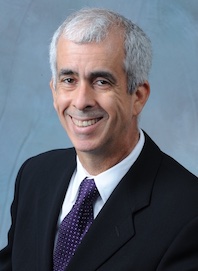Keynote and Accepted Papers
Keynote - Watch the presentation by Dr Humberto J. La Roche

Title: 5G Architecture and Emergence of the Edge
Abstract: Among the many areas of impact 5G will have is the nature of “edge”. As recently as ten years ago, with LTE and prior wireless generations, it was common to build networks with highly centralized service nodes. With LTE, we expect the traditional network morphology to flip on its heels with the emergence of a top-heavy “edge”. In this presentation, we discuss the interpretation and causes of this inversion and highlight some of the most immediate consequences.
Humberto J. La Roche is Principal Engineer in Cisco’s Mass-scale Infrastructure Group where he is responsible for 5G solution architecture. In his career spanning over twenty-five-year in telecom, he has been responsible for LTE systems engineering, product management of IMS and wireless softswitch products, product planning of optical networking and broadband access products, and transport network design. He is listed as author in over eleven technical papers and as inventor on over twenty patents. Humberto holds a PhD degree in Physics from the University of Texas at Austin.
Accepted Papers of 2021 - Watch the Video Presentations
The acceptance rate of the regular papers accepted this year is 17%. Accepted papers are included in the conference proceedings that is published by the IEEE Computer Society Conference Publishing Services.
Regular Papers
Priority-enabled Load Balancing for Dispersed Computing
Aaron Paulos (Raytheon BBN Technologies, USA), Soura Dasgupta (University of Iowa, USA), Jacob Beal (Raytheon BBN Technologies, USA), Yuangiu Mo (University of Iowa, USA), Jon Schewe, Alexander Wald, Partha Pal, Richard Schantz (Raytheon BBN Technologies, USA), J. Bryan Lyles (University of Tennessee Knoxville, USA)
Multilayer Resource-aware Partitioning for Fog Application Placement
Zahra Najafabadi Samani, Nishant Saurabh, Radu Prodan (University of Klagenfurt, Austria)
CHANGE: Delay-Aware Service Function Chain Orchestration at the Edge
Lei Wang (University of Calgary, Canada), Mahdi Dolati (University of Tehran, Iran), Majid Ghaderi (University of Calgary, Canada)
LEAF: Simulating Large Energy-Aware Fog Computing Environments
Philipp Wiesner, Lauritz Thamsen (Technische Universität Berlin, Germany)
AVEC: Accelerator Virtualization in Cloud-Edge Computing for Deep Learning Libraries
Jason Kennedy, Blesson Varghese, Carlos Reano (Queen’s University Belfast, UK)
Reducing the Mission Time of Drone Applications through Location-Aware Edge Computing
Theodoros Kasidakis, Giorgos Polychronis, Manos Koutsoubelias, Spyros Lalis (University of Thessaly, Greece)
TOD: Transprecise Object Detection to Maximise Real-Time Accuracy on the Edge
JunKyu Lee, Blesson Varghese, Roger Woods, Hans Vandierendonck (Queen’s University Belfast, UK)
Short Papers
Mapping IoT Applications on the Edge to Cloud Continuum with a Filter Stream Model
Shuangsheng Lou (Ohio State University, USA), Gagan Agrawal (Augusta University, USA)
PA-offload: Performability-aware Adaptive Fog Offloading for Drone Image Processing
Fumio Machida (University of Tsukuba, Japan), Ermeson Andrade (Federal Rural University of Pernambuco, Brazil)
A Privacy Preserving System for AI-assisted Video Analytics
Clemens Lachner, Thomas Rausch, Schahram Dustdar (Vienna University of Technology, Austria)
Distributed Resource Management Across the Edge-to-Cloud Continuum
Andre Luckow (Ludwig Maximilian University of Munich, Germany), Kartik Rattan, Shantenu Jha (Rutgers University, USA)
Performance Evaluation of Some Adaptive Task Allocation Algorithms for Fog Networks
Ioanna Stypsanelli, Olivier Brun, Balakrishna Prabhu (French National Centre for Scientific Research, France)
Accepted Papers of 2020 - Watch the Video Presentations
Deep-Edge: An Efficient Framework for Deep Learning Model Update on Heterogeneous Edge
Anirban Bhattacharjee, Ajay Chhokra, Hongyang Sun (Vanderbilt University, USA), Shashank Shekhar (Siemens, USA), Aniruddha Gokhale, Gabor Karsai, Abhishek Dubey (Vanderbilt University, USA)
Sunstone: Navigating the Way Through the Fog
Julien Gedeon, Sebastian Zengerle, Sebastian Alles, Florian Brandherm, Max Mühlhäuser (TU Darmstadt, Germany)
Comparison of Alternative Architectures in Fog Computing
Vasileios Karagiannis, Stefan Schulte (Vienna University of Technology, Austria)
Modelling Fog Offloading Performance
Ayesha Abdul Majeed, Peter Kilpatrick, Ivor Spence, Blesson Varghese (Queen’s University Belfast, UK)
A Multi-Weight Strategy for Container Consolidation
Najet Hamdi (University of Sfax, Tunisia), Walid Chainbi (University of Sousse, Tunisia)
SessionStore: A Session-Aware Datastore for the Edge
Seyed Hossein Mortazavi, Mohammad Salehe (University of Toronto, Canada), Bharath Balasubramanian (AT&T Labs, USA), Eyal de Lara (University of Toronto, Canada), Shankaranarayanan Puzhavakath Narayanan (AT&T Labs, USA)
Priority-based Fair Scheduling in Edge Computing
Arkadiusz Madej, Nan Wang, Nikolaos Athanasopoulos (Queen’s University Belfast, UK), Rajiv Ranjan (Newcastle University, UK), Blesson Varghese (Queen’s University Belfast, UK)
Efficient Hosting of Robust IoT Applications on Edge Computing Platform
Cosmin Avasalcai (Vienna University of Technology, Austria), Bahram Zarrin, Paul Pop (Technical University of Denmark, Denmark), Schahram Dustdar (Vienna University of Technology, Austria)
Mobility-aware Computation Offloading in Edge Computing Using Prediction (Short paper)
Erfan Farhangi Maleki, Lena Mashayekhy (University of Delaware, USA)